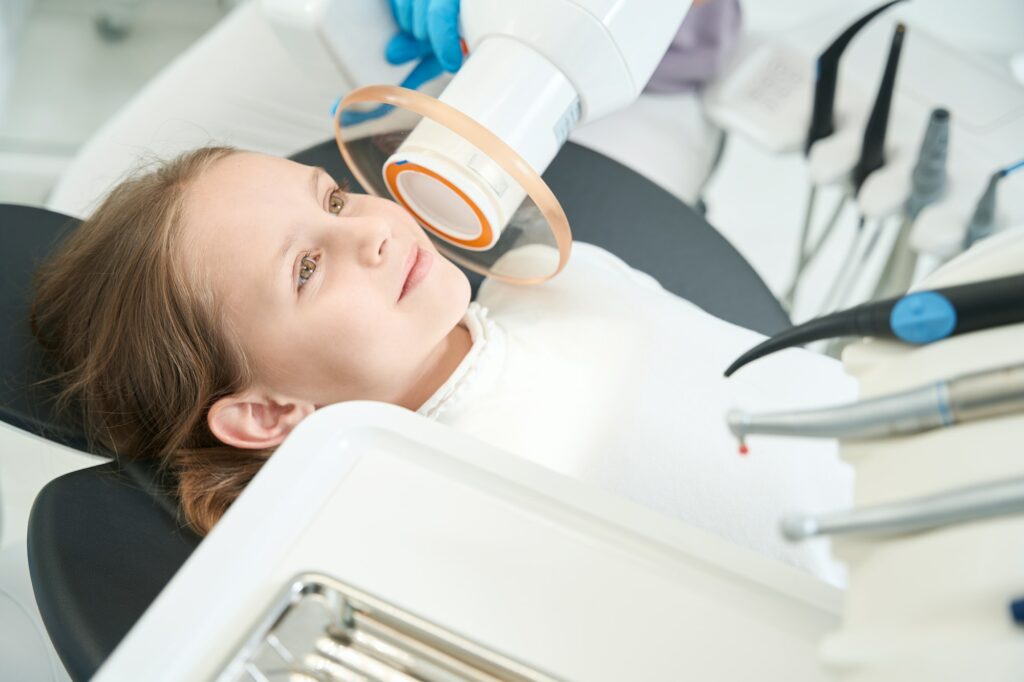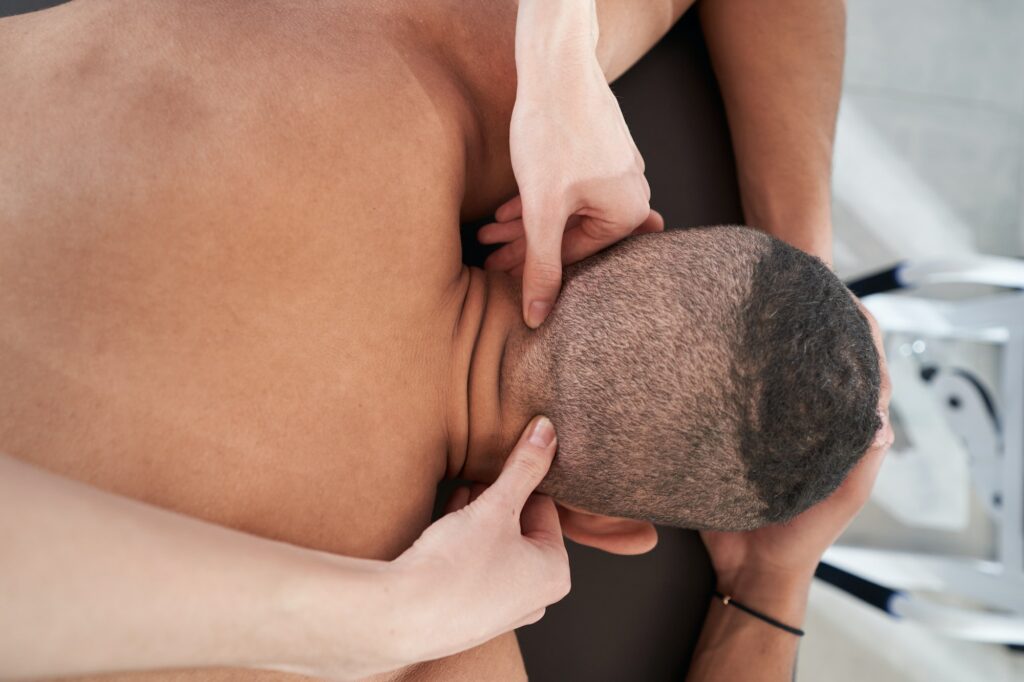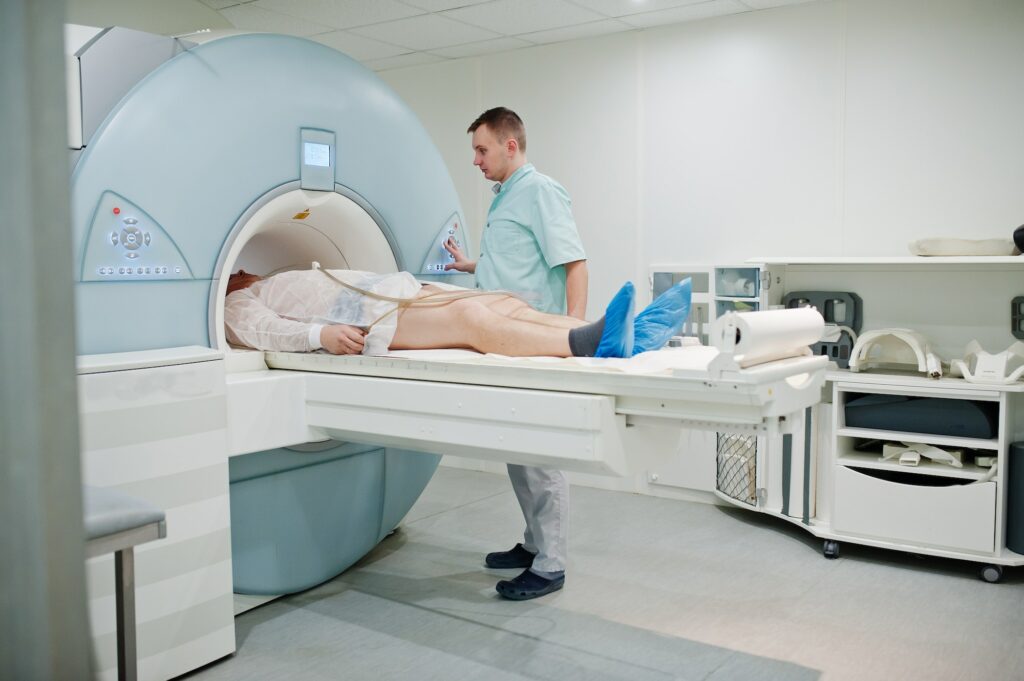Headache, neck, & jaw pain can be debilitating. Not many people understand the relationship between the three and the causes behind them. It is important to understand the causes and symptoms of these conditions to determine the most appropriate treatment.
Each person is unique, and there is no one-size-fits-all solution. By understanding these conditions and how they relate, you will be better equipped to prevent and manage them.

Various factors such as neurological or musculoskeletal issues, stress, poor posture, dental problems, and a range of other factors can cause headache, neck & jaw pain. Understanding the cause of your pain is crucial to determining the most effective treatment options for you.
Tension headaches are a type of headache caused by muscle tension and stress in the head, neck, and shoulders. They are usually described as dull, aching pain, and can last for a few hours or even days. Poor posture, stress, or anxiety often cause tension headaches.
Migraines are a type of headache that can cause severe, throbbing pain in the head and are often accompanied by nausea, vomiting, and sensitivity to light and sound. A range of factors, including hormonal changes, certain foods, and stress can cause migraines.
Cervicogenic headaches are headaches that originate in the neck and can cause pain in the head and behind the eyes. A range of factors, including poor posture, cervical spine disorders, or injury to the neck may cause these headaches.

Temporomandibular joint disorder (TMJ) is a condition that can cause pain and discomfort in the jaw, as well as headaches. A range of factors, including teeth grinding (bruxism), osteoarthritis, or rheumatoid arthritis can cause TMJ.
Myofascial pain syndrome is a chronic condition that can cause pain and discomfort in the muscles and connective tissue. A range of factors, including injury, poor posture, or overuse of certain muscles can cause this condition.
Trigeminal neuralgia is a condition that can cause severe, stabbing pain in the face. It is caused by a malfunction of the trigeminal nerve, which is responsible for facial sensory information. A range of factors, including injury, infection, or tumours can cause trigeminal neuralgia.
Other factors that can contribute to headache, neck & jaw pain include stress, anxiety, poor posture, dental problems, and other lifestyle factors. If you suffer from chronic headache, neck or jaw pain, it’s important to consult with a medical professional to determine the underlying cause of your pain.
If you’re experiencing headache, neck, and jaw pain, several treatment options are available. The most effective treatment will depend on your individual circumstances, including the root cause of your pain and your medical history. Here are some of the most common treatments for headache, neck, and jaw pain relief:

Physical therapy can be extremely beneficial for those experiencing headache, neck & jaw pain. A physical therapist can help you identify any posture or behavioural habits that may be contributing to your pain, and can develop a customised exercise programme to help you regain strength and flexibility. A physical therapist may also use manual therapy techniques such as massage, mobilisation, and manipulation to relieve pain and tension.
Chiropractic and osteopathic therapies can also effectively relieve headache, neck, or jaw pain. These therapies focus on the musculoskeletal system, particularly the spine, and use manual adjustments to relieve tension and improve alignment. Chiropractic and osteopathic therapies may also involve massage, stretching, and other manual techniques.
Acupuncture is another alternative therapy that can be effective for headache, neck & jaw pain relief. This ancient Chinese practice involves the insertion of thin needles into specific points on the body to stimulate energy flow and promote healing. Acupuncture has been shown to improve blood flow, reduce inflammation, and release endorphins, all of which can help reduce pain and tension.
Medication may be necessary for pain relief for those suffering from chronic headache and neck and jaw pain. Non-steroidal anti-inflammatory drugs (NSAIDs), analgesics, and muscle relaxants are commonly prescribed for pain management. Botox injections may also be used for those suffering from chronic migraines, as they can help reduce the frequency and intensity of headaches.

No matter your treatment options, it’s important to work with your healthcare provider to develop a comprehensive plan for managing your headache, neck & jaw pain. This may involve a combination of therapies and lifestyle changes to help prevent pain from recurring.
When diagnosing headache, neck, and jaw pain, doctors may use a combination of methods to determine the underlying cause. A detailed medical history and physical examination are usually the first steps in the diagnostic process. Your doctor may ask about the quality, frequency and duration of your pain and any associated symptoms or triggers.
It’s important to mention any sleep disturbances, grinding teeth, or clenching jaw that you may experience, as these can also be signs of orofacial pain. A differential diagnosis may be necessary to rule out other conditions that can mimic headache, neck & jaw pain.
Remember, the right diagnosis is crucial for effective treatment. Proper diagnosis requires a thorough examination of the structures involved in orofacial pain, which includes the temporomandibular joint, cervical spine, and other related tissues.
Diagnostic imaging studies such as MRI, CT scan, and X-rays may help identify structural abnormalities contributing to your symptoms. A dental examination may also be necessary to rule out any dental problems that could cause your pain.

It’s important to note that not all cases of headache, neck, and jaw pain require extensive diagnostic testing. Often, a proper diagnosis can be made through a detailed medical history and physical examination. However, if necessary, your doctor will recommend the appropriate diagnostic tests to provide an accurate diagnosis.
If you suffer from headache, neck & jaw pain, prevention is key to reducing the frequency and severity of your symptoms. Here are some strategies that can help:
If you experience chronic pain, it’s important to manage it effectively. This can involve a combination of medication, physical therapy, and other treatments. Speak to your healthcare provider about the best pain management options for you.
Stress and anxiety can aggravate headache, neck, and jaw pain. Biofeedback and relaxation techniques such as deep breathing, meditation, and yoga can help reduce stress levels and prevent pain from occurring.
Cognitive Behavioural Therapy (CBT) is a form of talk therapy that can help you manage stress, anxiety, and depression. It can also help you identify and change negative thought patterns that may be contributing to your pain.
Poor posture and ergonomics can contribute to headache, neck & jaw pain. Make sure your workspace is set up properly, and take frequent breaks to stretch and move around. You can also try exercises to improve your posture.
Regular exercise can help prevent headache, neck and jaw pain by promoting good blood flow and reducing stress levels. Aim for at least 30 minutes of moderate daily exercise, such as brisk walking, cycling, or swimming.
Understanding your condition and how to manage it can help you prevent pain from occurring. Speak to your healthcare provider, do your research, and consider joining a support group to learn more about headache, neck, and jaw pain.
Sometimes, simple lifestyle changes can help prevent headache, neck & jaw pain. This can include getting enough sleep, eating a healthy diet, avoiding caffeine and alcohol, and quitting smoking.

By preventing headache, neck, and jaw pain, you can improve your quality of life and reduce the impact of these conditions on your daily activities.